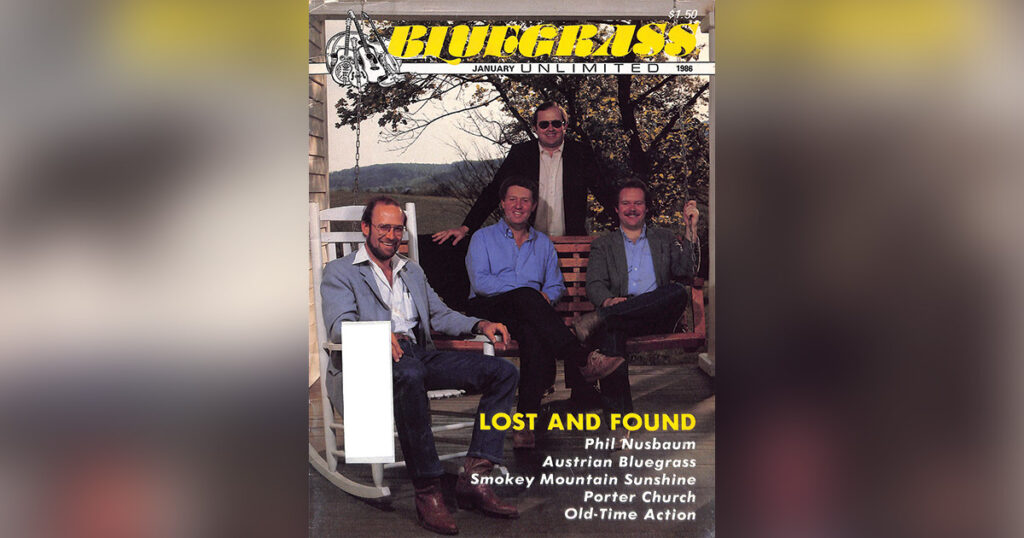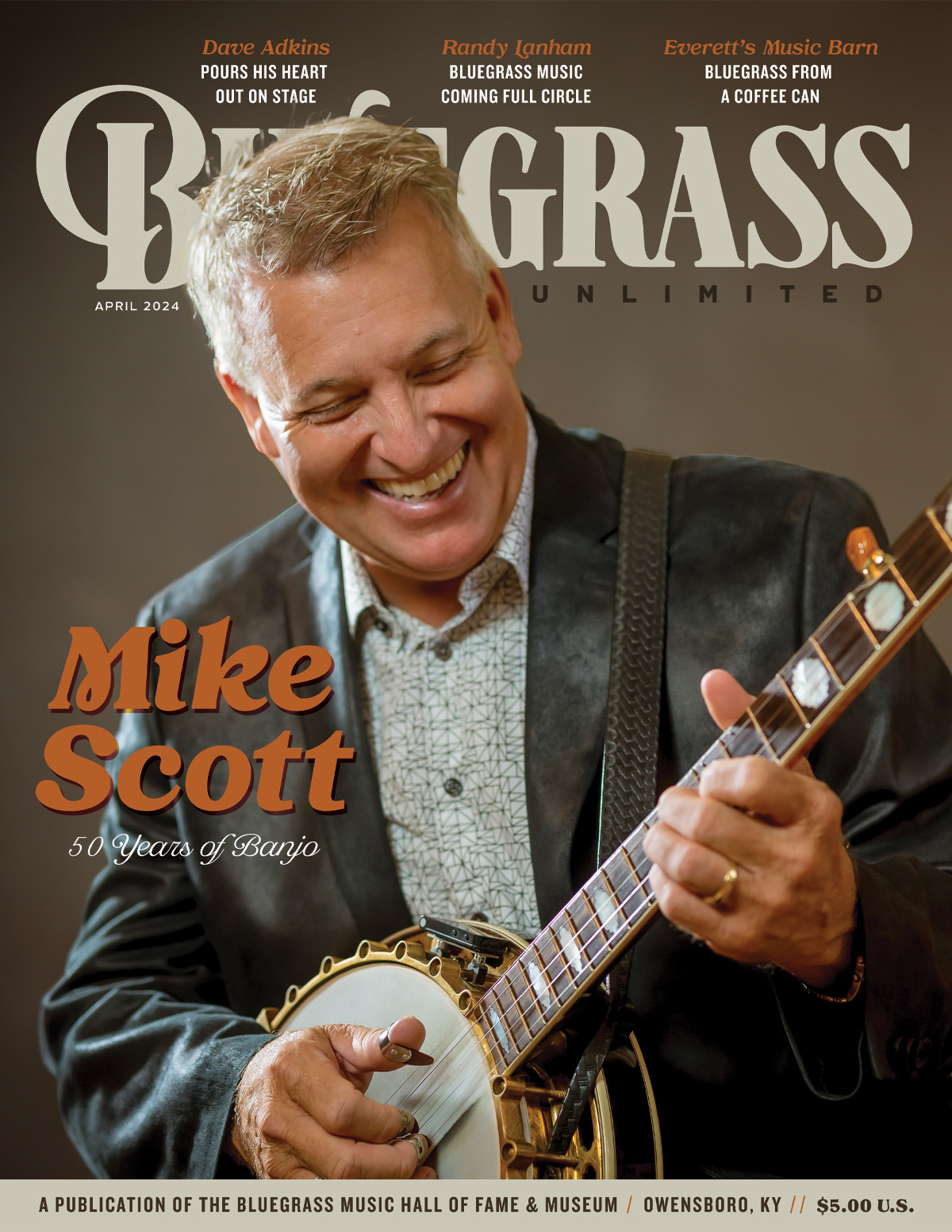Home > Articles > The Archives > The Lost & Found
The Lost & Found
Reprinted From Bluegrass Unlimited Magazine
January 1986, Volume 20, Number 7
“Wide open” best describes the picking and singing style of the Lost & Found —one of southwest Virginia’s latest contributions to bluegrass music.
Twelve years in the business seem to have taught the group several things. One is that planted-in-the-sod bluegrass lovers like their music delivered in a straightforward manner—whether it be a traditional tune or a novelty song they’ve just made up. The other is that fans are as important to the music and its performers as a chicken is to an egg.
While the Lost & Found has been around for several years, the current band has been together around a year. The sound has remained solid with three of the original band members holding the vocal and instrumental fort. The harmony is still good and the picking more than fine. Fans can hear the results of all this on their latest album called “Sun’s Gonna Shine,” on the Rebel label.
Forming a nucleus for the Lost & Found are three men who’ve been around since the days when they jammed in each other’s basements. Allen Mills of Charity, Virginia (“a spot right where Patrick, Franklin and Floyd Counties come together in a peak,”) is the daddy of the group name. He’s the resident bossman, too, handling show dates and bookings with the aid of the John Howard Agency in Hamilton, Ohio.
The band’s name came to Mills as he drove home after a nighttime jam of four friends who enjoyed playing bluegrass together. Three of them remain with the band —Mills, Gene Parker and Dempsey Young.
“They had been ‘lost’ in other bands,” Mills related, and now had “found” each other through a mutual love for bluegrass music. Their career was launched under the new name in October, 1973, on a cable TV program out of Martinsville, Virginia. After two years of television exposure, they were branching out to do shows all over their home counties, the Carter Homeplace in Hiltons, Virginia and on to Florida for festival work.
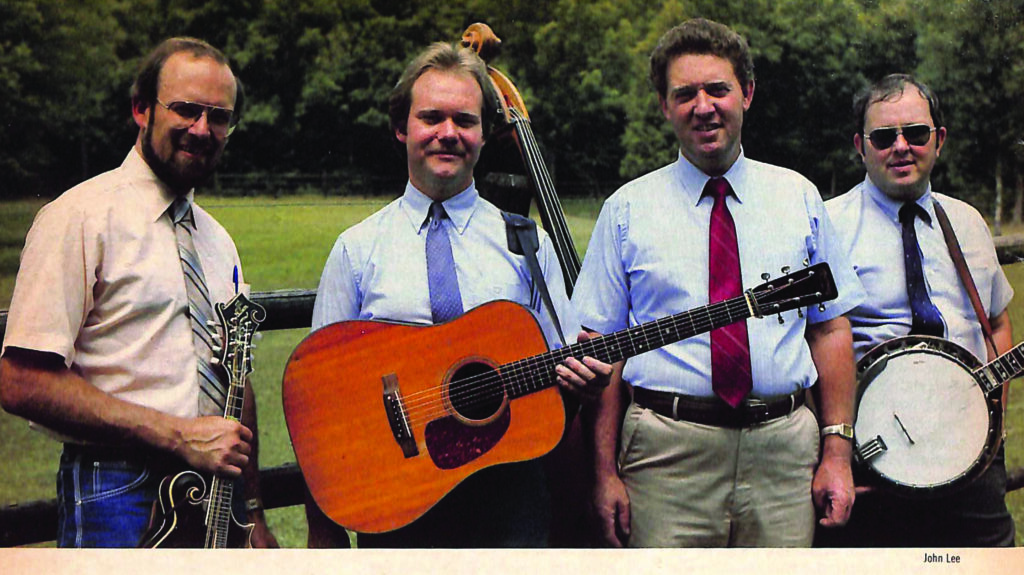
Now, the group is sharing its infectious enthusiasm for the music literally all over the world. They play regular showdates up and down the East Coast and recently completed a tour beginning in Florida, heading to New Mexico, Arizona, Nevada and California and returning via Utah, Idaho, Illinois, etc. They’ve played Canada and two years ago went to Europe for a 24-day tour.
Their arrangements of old standards plus original tunes were well-received by audiences in Sweden, Holland, Denmark, Germany and Switzerland.
The group recently was featured on the Nashville Network’s “Fire On The Mountain” television program. Their performance was filmed at Maggie Valley, North Carolina.
The Lost & Found’s newest album has two original pieces plus one by Pete Goble and Leroy Drum — “Leaving You and Mobile, Too.” Another original on the album is “The Rabbit Song” by former Lost & Founder Bubba Chandler. The third first-time piece was written by band member Steve Wilson as the group returned home from a showdate in Washington, D.C. It’s called “Colder and Colder.”
As with their previous albums, this one is a must for serious collectors of individual bluegrass styles. “Drifting With The Tide” is done as a trio number and “White House Blues” has Mills in the lead. Another Civil War era song, “My Home’s Across The Blue Ridge Mountains” also features Mills as lead singer.
All the band members relate influence by music greats Flatt and Scruggs, Bill Monroe, Stanley Brothers and Reno and Smiley. The Country Gentlemen and Seldom Scene also have left their mark on the group.
Mills explained that his bass playing and stage manner is reminiscent of Flatt and Scruggs. “We saw them in the area a lot,” he continued. “We liked their music, but we found out right off that we couldn’t play like other people.”
They chose instead, under Mills’ direction, to showcase each band member’s respective talent and work that special zing into arrangements of other folks’ tunes. Every so often, they do an original, no-holds-barred song that sounds too traditional to have just been written and arranged.
“We play the basic styles of other bands maybe, but we play it like we like it in our own voices and with our own feelings,” Mills explained. He said he has become aware of one fact —“if you’re gonna do something long-term, you’ve got to have a long-term ambition to do what you’re doing the best you can.”
He echoes the sentiments of other band members: “We try to make our music sound like the feeling we get when we hear other good groups perform.” Even the casual bluegrass fan will be impressed with the fruits of their collective ability to mix their ambition with what they hear, what they want to do and the reason for it all and blend it for a result that titillates the eardrums and never fails to set an audience’s feet to tapping in time.
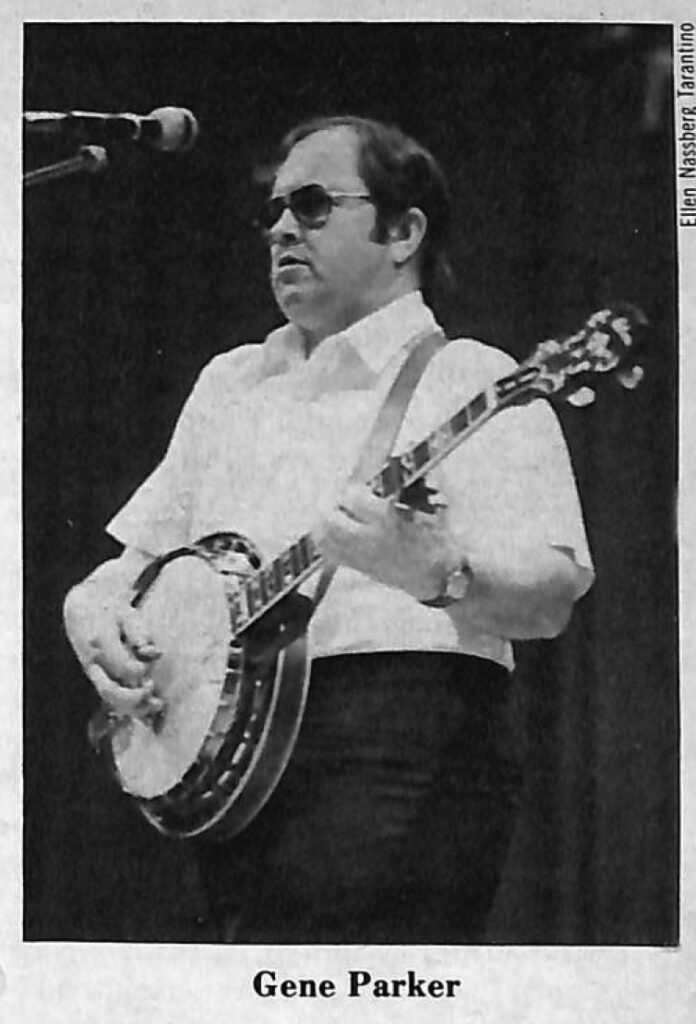
Mills has been playing standup bass since 1959 and usually sticks to it on stage. However, he can be counted on to pick up the guitar occasionally. Early in his career, he recorded with the Easter Brothers and the Green Valley Quartet.
He likes to say that individuals have paid him back more than he’s put into the music. He has, however, paid his dues. Since December 31, 1977, Mills has been depending on his musical abilities for a living. For the past six years, music has been his only paying job.
“It’s a challenge,” he admitted, to find bookings, get the band members all traveling in the same direction at one time and to negotiate showdates close to each other for longer road trips. He also has to keep his performance adrenalin flowing.
The key, Mills said, is to love what you’re doing and have a desire to entertain those who come out to see you. Entertainment and not much gab is just what audiences get when they see the Lost & Found in person, there’s just enough talk from emcee Mills to nudge the show in the right direction and enough interplay between band members to keep audience enthusiasm up.
Mills, known for his knack of saying just enough of the right thing to introduce pieces on stage, said he has operated from the beginning with a thought to the friendly, downhome style of Lester Flatt, the stage sincerity of Porter Wagoner and the Reno and Smiley technique of playing good music to as many people in as many places as possible.
He sings lead and tenor on stage and albums and has several original vocals to his credit. These include “Wild Mountain Flowers For Mary” (Larry Sparks recorded this one in two of his albums and “broke the ice” for acceptance outside the Lost & Found’s regular listening audience) and “Love Of The Mountains” (an “evergreen” bringing in regular royalty checks).
“When an artist of some acclaim asks to record one of my songs, I usually say OK,” Mills said. “When I hear people singing something I’ve written, it makes me feel good.”
Joining Mills in the Lost & Found partnership is banjo player Gene Parker of Ferrum, Virginia. He’s been honing his clear, syncopated banjo licks for 25 years with the initial help of Allen Shelton and Sonny Osborne.
“These two helped me the most;” he noted reverently, “but I guess I play like myself.”
Parker sometimes takes up a fiddle to make it a duo on stage appearances. He also sings lead and baritone. His part of the band management is preparing the tune lineup for performances. He always gives everybody a shot at the spotlight. The programming is easy, he said, because there’s no lack of talent in the group.
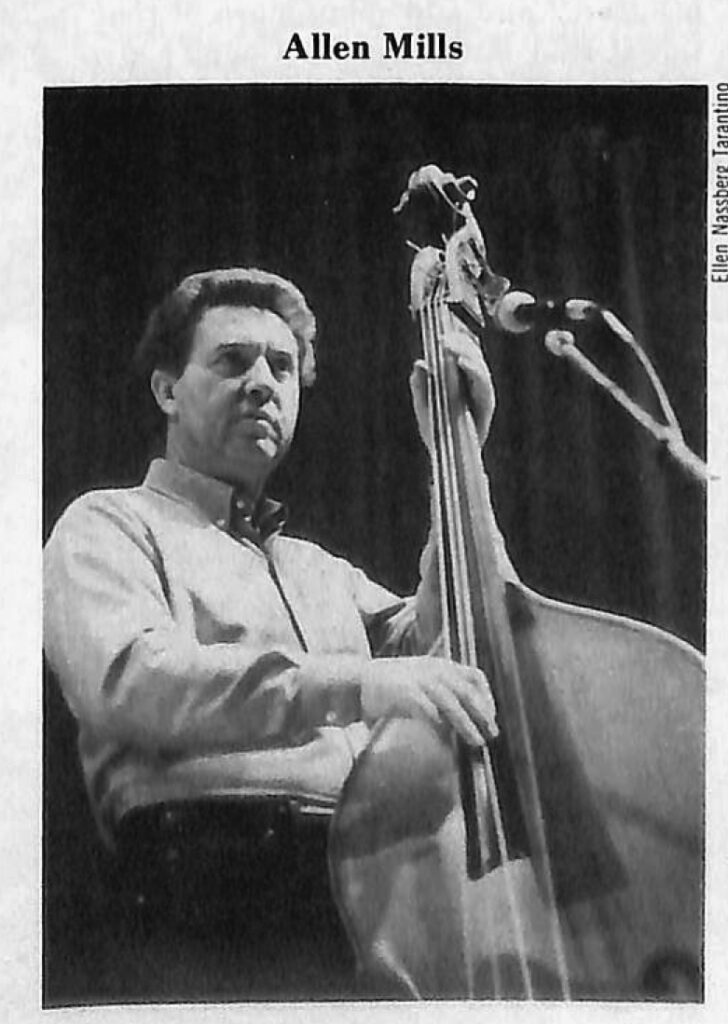
His own talent is evident with the sounds of his smooth, driving banjo ringing through everything the Lost & Found performs.
Parker has an instrumental album of his own on the Prime Time label (a branch of Outlet Records). His most requested original effort is “Strutting to Ferrum.” He explained that he took part of an old tune and “added to it” for the final product.
Audiences often ask for his rendition of Sonny Osborne’s “Sunny Mountain Chimes” and it’s included on one of their first recordings.
Through a friendship with Osborne, Parker has picked up an ability to come up with the unexpected, inspired lick at just the right time—kind of like good gospel preaching, one fan said.
Dempsey Young of Endicott, Virginia is the third original band member. He’s the critic in residence, called up to mastermind arrangements of words and music to standard bluegrass songs and those from other fields. “We use the usual words and tunes to standards and new songs by other artists,” he explained, “but I work out the beginning and ending Lost & Found will use.”
Young has been playing the mandolin professionally (“this means depending on the instrument for a living”) for the past six years. Before that, he was semi-professional (“played a lot but had to work to support my habit”).
He was chosen best mandolin player at the Galax (Virginia) Old Fiddlers Convention in 1972 and ‘73, and was the Virginia State Mandolin champ in ‘81.
Young’s playing was influenced by Doyle Lawson and Buck White.
Sharing some of his inner thoughts, Young commented, “My greatest pleasure is music. It’s my way of being around other people and making them happy.” He never misses an opportunity to thank the DJs who play the Lost & Found records and the promoters who have made their degree of success possible. “Without them and the fans, we couldn’t do this for a living.”
Reflecting, he added, “I think we’ve been very fortunate to be one of the very few bluegrass groups who can play the music full-time and support ourselves.” (In six years as partners, the three original bandmembers say they’ve turned a profit—“small, maybe, but in the black.”)
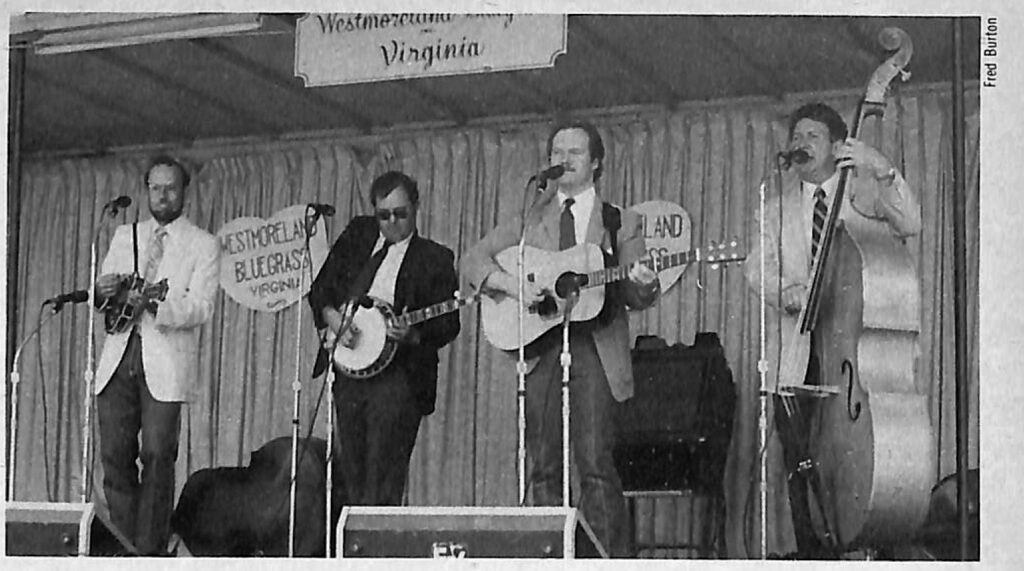
Recently surveying the interior of the Lost & Found’s tour bus, with an eye to the color TV, microwave, VCR and other appendages, Young noted, “We’ve come a long ways. I’ve played music because I like it—not to make a living. Then we started getting together for fun and it got out of hand.” The work, however, isn’t work at all, he emphasized.
Sometimes on stage, Young lays down his mandolin and puts a bow to his fiddle. He plays guitar, too, and sings all the parts. He’s the performance buffer as well. “I try to add humor to the show … attempt to be entertaining as a change of pace from the straight bluegrass format.”
A little fun, Young said, is needed in the show. “People love the music but they need to catch their breath between heavy pieces.”
He has some tunes along those lines. An audience favorite is a swing- influenced instrumental, “Goofus.”
His mandolin playing goes back 12 years. His critical ear for staging and album mixing goes back even farther, partly because he comes from a musical family. He and Mills attended to the mixing chores on the most recent album.
It’s Young who gets the credit for keeping the Lost & Found “in character,” Mills said. “He makes us try harder to play better and better.”
With the others, Young takes a turn at such chores as cleaning and driving the bus. “We’re traveling more and more,” he explained, noting that his behind-the-wheel hours are usually midnight to dawn.
They bought their current wheels in 1981 already outfitted with the comforts of home. It’s affectionately known as “The Lost & Found Hilton.”
With the variety of talent the band now possesses, every showdate offers unlimited possibilities for the audiences’ pleasure. The addition of Steve to the band has increased the group’s repertoire.
Steve Wilson of Lynchburg, Virginia, adds a multitude of talent to the Lost & Found. His usual chore is playing an authoritative lead guitar or smooth rhythm, but the Dobro is another favorite instrument.
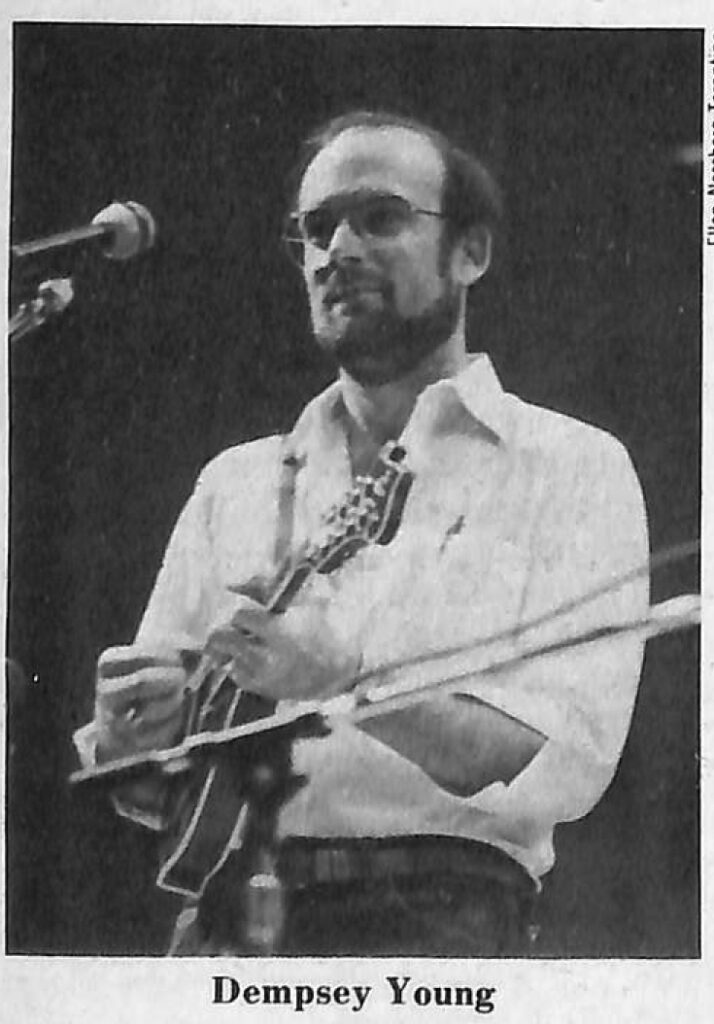
Wilson’s solid, definitive bass voice is heard in many of the group’s arrangements. He often teams with Mills for tight harmony on such tunes as “Maple On The Hill” and, on the current album, “The Sun’s Gonna Shine In My Backdoor Someday.”
Wilson’s chameleon voice provides a haunting version of Jimmie Rodger’s hobo-train styles sung on stage to the lone accompaniment of his own guitar. He has a lot of imitations at the ready but performs only a few “to break up the program” and add some more of that interest that is the Lost & Found’s strong suit.
Hairs raise on audience members’ arms as Wilson does his version of “Nobody’s Darlin’ But Mine” on stage. This is on the new album, too.
As a member of Don Reno’s Tennessee Cutups, Wilson recorded two albums on the CMH label. He wrote and sung three tunes on them—”My Arms Are Empty And Cold,” “What Can I Say” and “Daddy’s A Hardworking Man.” His last work with Reno was on“Sing An Old- Fashioned Song.”
Wilson has written some Dobro instrumentals and sometimes lends his talents on that instrument to other performing groups.
He began his career on the Dobro with Cecil Hall and the Dominion Bluegrass Boys backing Charlie Monroe in 1973. The same year, he met Cliff Waldron at the Berryville Festival and was offered a job with the New Shades of
Grass. He played ‘74 through early winter with Waldron.
The musician recalls that he was in high school then and would catch the bus on Friday evenings, play through the weekends and return to school Monday morning. Some of his “spare” time was spent working in a retail store between practice sessions.
About then, Don Reno moved to Lynchburg and Wilson joined forces with the Cutups in October 76. Shortly, he began playing guitar and singing in performances, working with Reno until November ’83. Their last show together was in Myrtle Beach, South Carolina, at Thanksgiving. He came to work with the Lost & Found about two weeks later.
His imitations are “just picked up,” he explained. He admits to a flair for “copying” popular radio artists.
Wilson first learned to play the guitar “Lefty Frizzell style.” Then, when he heard Jimmie Rodgers, he copied him until he learned the guitar licks and songs. Next, the turned to Uncle Josh Graves’ Dobro.

He was away from bluegrass for a time, working with Super Grit Cowboy Band out of South Carolina. He played rhythm guitar on a bluegrass song for them and once dubbed in a line as Merle Haggard.
Wilson credits Mike Auldridge with helping him, especially when he was working with Cliff Waldron. Then Jerry Douglas impressed him and he picked up some Dobro techniques from him —“I still throw in a few of his licks every so often,” Wilson said. He acknowledged that his ultimate style on both guitar and Dobro are culminations of what he hopes are the best licks of the best performers he’s heard on each instrument.
“I try to play my own style, taking the best of everybody and putting it all together.” Spoken like a true Lost & Founder.
Playing bluegrass music on the road is a sacrifice of sorts. Mills concluded. “We could all make steady money on regular-hour jobs, but we do it because we like it. And our fans seem to like it, too.”
He expressed gratitude for the “downhome” type of folks that make up their major following. “They make us feel good by taking us into their homes, feeding us, following us from show to show, being our friends.”
As a thank you gesture to their fans, the Lost & Found puts on a Homecoming Festival (now in its fifth year) the third week of July in Franklin County, Virginia (home to Mills, Parker and Young). A concentration of their earliest fans live there and remain faithful to the Lost & Found’s unique brand of entertainment.
